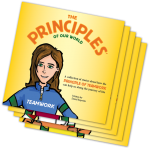 The transition of divorce is hard enough, but with that transition comes another, the transition of blending families.
The transition of divorce is hard enough, but with that transition comes another, the transition of blending families.
If you are a child of divorced parents or have experienced a death of a parent, this transition is inevitable in your life. Blending families is hard; it stirs up many emotions and difficulties. It takes time for the transition to become non-existent and become the family’s new normal, but with these tips the transition will be easier for yourself, your family, and your new family.
Moving in together
Making a house a home with a new family is hard. You grew up in separate households so you have different habits and are used to doing things a certain way, but when you blend families you have to compromise. Compromise is key for living with your new stepfamily. You have to understand that this transition is new for them too, and it will take time for them to get accustomed to it just like it will for you. Taking the time to learn their habits and talk openly about any problems that may arise will create a healthy living environment for everyone.
Accepting and liking your new step- parent
Your new step- mom or step- dad will never replace your biological mom or dad, but that doesn’t mean you shouldn’t get to know them, like them, and treat them with respect. Your mother or father married this person for a reason, so give them a chance to be a good stepparent to you.
Accepting and liking your new step- siblings
Like the relationship with your step- parent, the more effort you put into your relationship with your new step- siblings the easier it will be to live together and become a family. If you have siblings but your stepsibling is an only child, make sure you and your siblings include them.
Spending holidays together
The saying, “old habits die hard” is true. Your holiday traditions and your stepfamilies holiday traditions will merge together to create new traditions. This change can be hard to accept, especially during the holidays, but welcoming it with a positive attitude and an open mind will ensure the holiday cheer.
Tips for parents
- Don’t expect your child and new step- child to acclimate to the transition right away.
- Give your child and new step- child time to adjust to the blended family.
- If possible, give your child and your new step- child their own rooms at the new house.
- Listen to your child’s feelings about the transition.
For more help and advice with the transition from elementary school to middle school check out Harvest Time Partner’s Face to Face conversation games.
Harvest Time Partners thanks contributing writer Emily Garber for her insights on life’s transitions.
 Tolstoy once said, “Happy families are all alike; every unhappy family is unhappy in its own way.”
Tolstoy once said, “Happy families are all alike; every unhappy family is unhappy in its own way.” A common transition that not many parents nor kids are prepared for is the transition of moving. Moving to a new city or state is a challenge for both the parents and kids. Often times people only sympathize with the children who are “forced” to move to a new school, find new friends, and join a new sports team or club, but the parents also have to find new friends and adapt to a new community.
A common transition that not many parents nor kids are prepared for is the transition of moving. Moving to a new city or state is a challenge for both the parents and kids. Often times people only sympathize with the children who are “forced” to move to a new school, find new friends, and join a new sports team or club, but the parents also have to find new friends and adapt to a new community. Elementary school is all fun and games until it is time for the transition from elementary school to middle school. Middle school is a major transition in a child’s life that is filled with physical, mental, and emotional changes and includes many firsts. Like the first time with no recess, the first time to switch teachers every hour, the first time to take honors classes, and the first time to play for your school’s sports team.
Elementary school is all fun and games until it is time for the transition from elementary school to middle school. Middle school is a major transition in a child’s life that is filled with physical, mental, and emotional changes and includes many firsts. Like the first time with no recess, the first time to switch teachers every hour, the first time to take honors classes, and the first time to play for your school’s sports team. The transition from middle school to high school is like walking into another town’s shopping mall; some of it is familiar, but the majority of it is new. You have some of the same friends, teammates, interests and habits, but then there’s the new- a new school, new classes, new teachers, new sports teams, and new friends. With all of these major life changes, drama, relationships, parties, and peer pressure inevitably comes too.
The transition from middle school to high school is like walking into another town’s shopping mall; some of it is familiar, but the majority of it is new. You have some of the same friends, teammates, interests and habits, but then there’s the new- a new school, new classes, new teachers, new sports teams, and new friends. With all of these major life changes, drama, relationships, parties, and peer pressure inevitably comes too. The transition from high school to college is one of the biggest transitions in our young adult life. It is the time when we escape our roots and move to a new place to discover a new version of our self.
The transition from high school to college is one of the biggest transitions in our young adult life. It is the time when we escape our roots and move to a new place to discover a new version of our self. Portage, MI (August 18, 2016) — Harvest Time Partners, Inc., a rapidly growing personal and professional development company, announces that its 4 A’s of Leadership for Families program is now available for FREE from the
Portage, MI (August 18, 2016) — Harvest Time Partners, Inc., a rapidly growing personal and professional development company, announces that its 4 A’s of Leadership for Families program is now available for FREE from the  Portage, MI (November 5, 2014) – Harvest Time Partners, Inc., is pleased to announce that its children’s book series, The Principles of Our World, has been honored by The Tillywig Toy & Media Awards with a 2014 Tillywig Brain Child Award, a prestigious recognition that is only associated with products of “high educational value.”
Portage, MI (November 5, 2014) – Harvest Time Partners, Inc., is pleased to announce that its children’s book series, The Principles of Our World, has been honored by The Tillywig Toy & Media Awards with a 2014 Tillywig Brain Child Award, a prestigious recognition that is only associated with products of “high educational value.” Portage, MI (October 29, 2014) — Harvest Time Partners, Inc., a rapidly growing personal- and professional-development company, announces the launch of a new game as part of its award-winning Face to Face® conversation-game series. The new game, Face to FaceBible Edition, is part of Harvest Time Partners’ Character Creates Opportunity® brand and is suitable for ages 10 and above. The new conversation game is available for purchase today.
Portage, MI (October 29, 2014) — Harvest Time Partners, Inc., a rapidly growing personal- and professional-development company, announces the launch of a new game as part of its award-winning Face to Face® conversation-game series. The new game, Face to FaceBible Edition, is part of Harvest Time Partners’ Character Creates Opportunity® brand and is suitable for ages 10 and above. The new conversation game is available for purchase today.